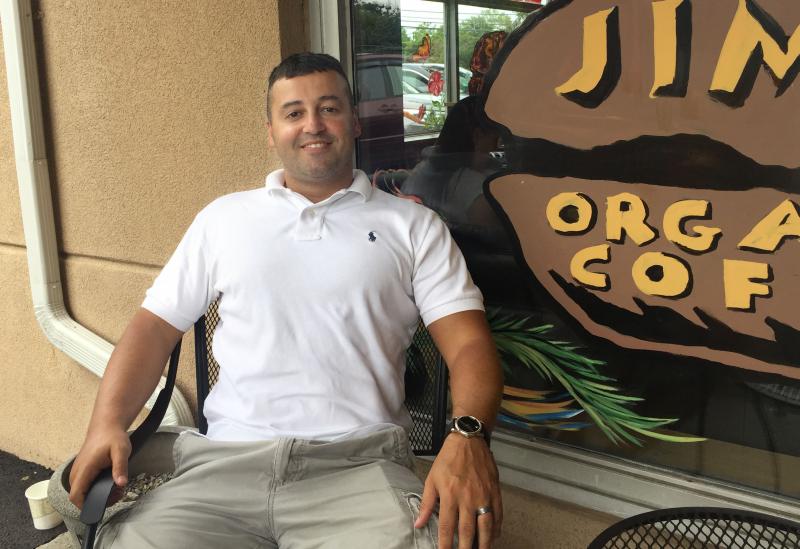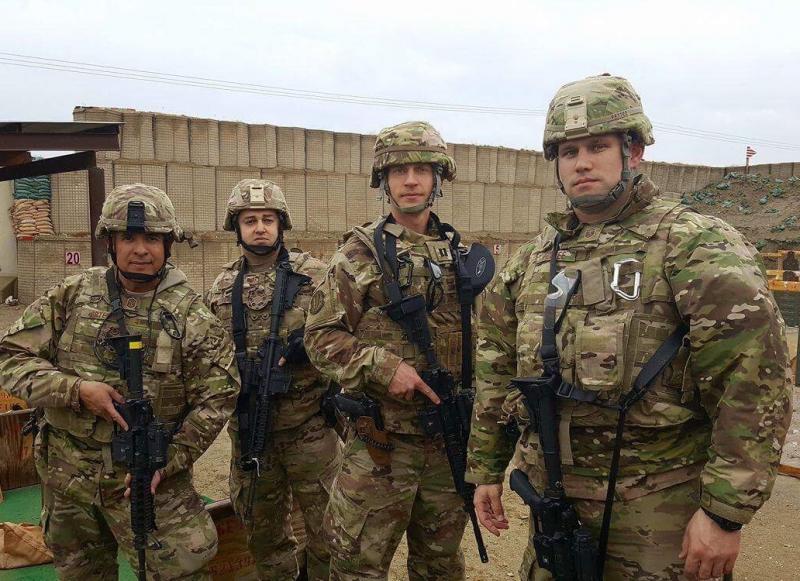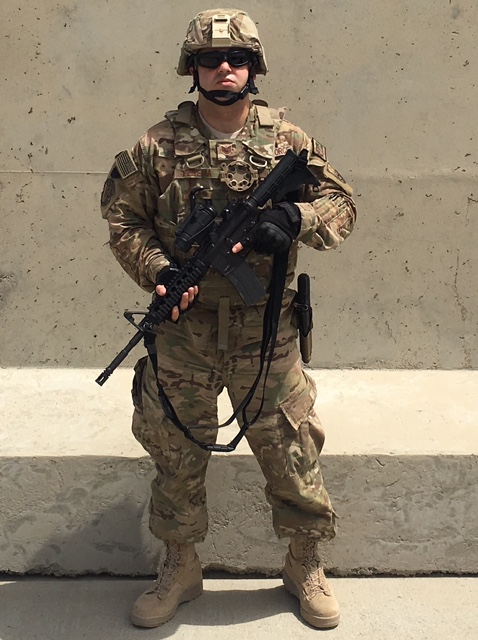Air National Guard sergeant talks bombs in Afghanistan, justice for 9-11, and an overseas memorial
Motivated by the September 11 terrorist attacks, Christopher Pereira knew he wanted to serve his country. But the Dartmouth native pushed it to the back burner because of his studies at Bridgewater State University and his campaign for the town's School Committee, which he won.
When Operation Iraqi Freedom was launched in 2003, Pereira knew he could no longer put it off. He signed up to be a citizen soldier with the Air National Guard — a requirement of one weekend per month and 15 days — that landed him in a six-month deployment overseas as a tech sergeant 14 years later. Pereira returned from the stint in Qatar and Afghanistan this July, shortly after his 37th birthday.
Now readjusted to his full-time employment as a sales executive for New Horizons Computer Learning Centers in Lincoln, Rhode Island, Pereira chatted about his experience.
Why were you sent to Qatar and Afghanistan?
In the Air Force, I'm a logistical planner. We do short-term and long-term planning for exercises and missions. Whenever another branch of the military is looking for specialized personnel, that's where we come in.
I spent two months in Qatar [where the Air Force's central command is located; all Middle Eastern operations are overseen there], two months in Afghanistan, and returned to Qatar for the remainder of my deployment.
I volunteered to go to Afghanistan. That was a no-brainer for me. They have a small staff of about six [people], and we have to support about 350 airmen.
How were the living conditions overseas compared to those of the United States?
In Qatar, air quality is a big problem. They burn their trash, and they don't really have recycling, so you're breathing in that stuff. And, it's 120 degrees, but feels like 140.
In Afghanistan, your air quality's even worse because they don't have any kind of infrastructure really. Their airport was probably the size of Marisol's Cafe. It's a remote, poor country. We had indoor plumbing, but you can't drink that water.
Being new to that type of environment, what sorts of emotions arose during your trip?
Bagram Air Base is the largest base in Afghanistan, but it's in a bowl surrounded by mountains. Terrorists get as close as they can and launch rockets and artillery shells hoping to damage airplanes and kill people. Thankfully, I was only outside two or three times when they hit us.
You have to rely on your training, the people you serve with, and your faith. Guys got killed [off base] while I was there. It makes you remember what's important and keeps your eye on the prize.
Attending Mass every week in Afghanistan was a unique experience. You were still on edge. There were armed guards outside the church [which was on base], but you try to have that 45-minutes of peace.
I got to go to the NATO headquarters in Kabul [Afghanistan], and see some of the airmen that we were supporting there. That was rewarding. I went one time with the British Royal Air Force and got to see how they operate.
How have the September 11 attack, your grandfather's service in World War II, and your Dartmouth upbringing influenced your military involvement?
I saw the September 11 attack unravel on TV. It was a 21st century Pearl Harbor. Landing in Afghanistan — where terrorists were harbored — and to have justice done was important to me. We get to prevent Afghanistan from becoming a hotspot for terrorists ever again. I'm proud of that.
But, I didn't do anything compared to those who serve in regular combat, got injured, gave their lives... those guys are heroes. I'm just a guy from Dartmouth.
My maternal grandfather — Manuel Sylvia, Jr. — served as a private in the army in the Pacific. I had a chance to talk to him about that, and growing up in through the Great Depression. They truly were the greatest generation. He passed away four years ago at 92 years old.
What's one moment from your deployment that you'll never forget.
The first time in our headquarters building, there's a small room called the Heritage Room. There's an unused dinner plate, a candle, and a Bible that are to remain unused. It's a reminder of all those that gave their lives, and it symbolizes breaking of bread with your fellow soldiers. It's very powerful.
How have you changed since returning from your deployment?
[My experience] reinforced a lot of what I believe, and it strengthened my faith. Before returning to Qatar, a man from Uganda asked me if I'd like to pray. Those moments help you. You understand that there's someone much larger in charge, and you give your burden to Him.
While overseas, you enrolled for another two years with the Air National Guard. What influenced that decision?
I reenlisted on July 4. Other than Christmas, that's my favorite holiday. I said, "I might not get this opportunity again." [Pereira's service term would have otherwise concluded in September.]
Pereira was awarded a coin for excellence by Major General Jeff Taliaferro, Commander 9th Air and Space Expeditionary Task Force—Afghanistan, and Commander, NATO Air Command—Afghanistan and Command Chief Master Sergeant Lisa Arnold, 9th Air and Space Expeditionary Task Force—Afghanistan. He has also been recommended for the Air Force Commendation Medal for distinctive meritorious service and achievement during his tour.
Pereira is a Town Meeting member for Precinct No. 9, a member of the Dartmouth Veterans Advisory Board, former Grand Knight of the Knights of Columbus council #14236, and a former School Committee member (2002-2008).
He is assigned to the 102nd Intel Wing at Otis Air National Guard Base on Cape Cod.















